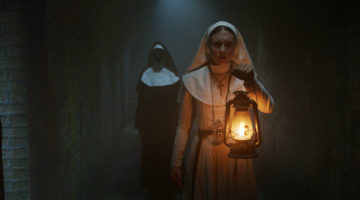Movie Review: House at the End of the Street
It doesn’t take too long watching House at the End of the Street to understand why the ominous abode is located so far away: it’s not because it’s evil or supernatural or perilous, it’s because it’s boring. The film gives both streets and houses a bad name, and in fact, as you soon learn in the film, there are two houses near each other of some note, not just one.
Nominal confusion aside (there is also the matter of the film being dubbed HATES, even though that is a very selective and uninspired abbreviation), there is far more laugh-out-loud material than there are scares in this film starring Jennifer Lawrence as the young heroine whose curiosity and trusting nature get her into trouble.
She plays Elissa, a bright-eyed singer-songwriter who moved from Chicago with her divorced mother Sarah (Elisabeth Shue) to live in the middle of nowhere, more or less. Elissa and Sarah go through trite arguments typical of the angst-ridden teen and struggling single mom tropes. While that passes time, Elissa befriends Ryan, the boy who lives in a vast empty house by his lonesome, within eyeshot of Elissa’s new abode, a place that is infamous because Ryan’s sister murdered their parents in it.
Some would argue that is weird – in particular the townspeople (read: generic, angry villagers) shun Ryan, as they are wont to do. Naturally, Elissa develops a crush on Ryan and—you guessed it– her mom is none too pleased.
This kills more time before the film actually gets interesting while never getting scary. Of course there is something more to Ryan, but by the time you find out, you’ve likely moved on elsewhere in your mind. The dialogue is riddled with cheese and the only time your heart may raise its pulse will come between eye-rolling, head-shaking, and the awkwardness you’ll feel for some charming actors spewing out inane lines.
Lawrence has about as much on-screen chemistry with Shue as she does with a strangely-shaped tree she sometimes stares at. A boy at school that tries to get Elissa drunk spews pick-up lines such as, “my famine-relief group is meeting today after school,” and Officer Weaver is clearly the most bored and socially awkward cop you’ve ever seen trying to play it straight, and the receding hairline doesn’t help.
What results is nothing close to shock or bewilderment; it’s more a mild musing, or a loud, momentary, “hmmm.” This dwelling seems to occupy the same uneventful neighbourhood as Dream House, a young, fledging development that can only hope to one day rise to the likes of Silent House, or to a less extent, the House on Haunted Hill, and nowhere near as startling as The Last House on the Left, or as dedicated and violent as House of 1000 Corpses.
A beautiful cast, saturated colour palate—which gives the film less an eerie feel and more a sense of a crisp autumn evening—and about 15 minutes of interesting plot developments unfortunately doesn’t really make House at the End of the Street worth the trip. For what it’s worth though, Lawrence seems herself a stare. She with her piercing blue eyes and tight, white tank top will surely attract audiences, as she balances out her resume, filling in alongside a blockbuster franchise in The Hunger Games and an acclaimed indie flick in Silver Linings Playbook, a generic, forgettable, attempt at a mediocre audience-pleaser.
[star v=2]




